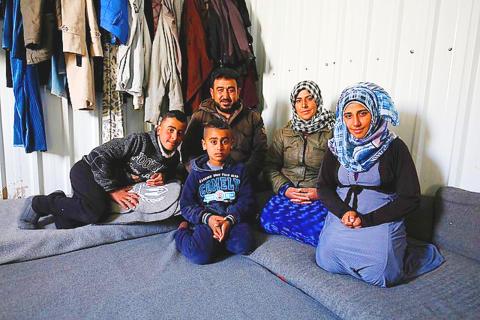Taiwan’s International Cooperation and Development Fund (ICDF) has partnered with Columbia University in New York City to develop a mobile healthcare app so that Syrian refugees in Turkey can have better access to healthcare information, the organization said yesterday.
Earlier this month, the ICDF — the nation’ s dedicated foreign aid organization chaired by Minister of Foreign Affairs Joseph Wu (吳釗燮) — agreed to collaborate with Columbia University’s Center for Sustainable Development on the Refugees Act and Communicate for Health (REACH) project, ICDF Secretary-General Timothy Hsiang (項恬毅) told a news conference in Taipei.
The university reached out about collaborating on the project after the organization visited the center last year, he said, adding that the ICDF has promoted public healthcare in many nations.

Photo courtesy of the ICDF
This is the first time that the organization has worked with the university and the first time that it would be participating in a humanitarian aid project in Turkey, he added.
As part of the arrangement, an ICDF volunteer is to spend one year in Istanbul, a metropolitan area that hosts many refugees, the organization said.
The volunteer would assist center staff in setting up and running the program, facilitating communication between the project and community groups, and learning the users’ needs, it said.
The ICDF is working with the university on developing requirements for the position, it added.
Initially, the mHealth (mobile health) app would have basic information, such as telephone numbers and addresses, for local healthcare facilities, while other features are to be added based on users’ needs, the organization said.
To advocate for the healthcare rights of refugees, the REACH project plans to create a Web site, host panels and photography exhibitions, and publish media and policy reports, Hsiang said.
The project also seeks to publish relevant research in international scientific journals, he said.
It hopes to raise awareness about refugee health by fostering dialogue and cooperation among refugee youth, local youth, the Turkish government, local non-profit organizations, academic institutions, and other groups and individuals, he said.
Since Syria’s civil war erupted in 2011, 5.6 million refugees have fled to neighboring countries, the organization said, adding that Turkey has taken in about 3.6 million registered Syrian refugees, the most of any nation.
Although the Turkish government provides free healthcare to registered refugees within its borders, the healthcare information that refugees can receive is impeded by factors such as geographic location, financial ability and language barriers, the organization added.

NATIONAL SECURITY THREAT: An official said that Guan Guan’s comments had gone beyond the threshold of free speech, as she advocated for the destruction of the ROC China-born media influencer Guan Guan’s (關關) residency permit has been revoked for repeatedly posting pro-China content that threatens national security, the National Immigration Agency said yesterday. Guan Guan has said many controversial things in her videos posted to Douyin (抖音), including “the red flag will soon be painted all over Taiwan” and “Taiwan is an inseparable part of China,” while expressing hope for expedited “reunification.” The agency received multiple reports alleging that Guan Guan had advocated for armed reunification last year. After investigating, the agency last month issued a notice requiring her to appear and account for her actions. Guan Guan appeared as required,

A strong cold air mass is expected to arrive tonight, bringing a change in weather and a drop in temperature, the Central Weather Administration (CWA) said. The coldest time would be early on Thursday morning, with temperatures in some areas dipping as low as 8°C, it said. Daytime highs yesterday were 22°C to 24°C in northern and eastern Taiwan, and about 25°C to 28°C in the central and southern regions, it said. However, nighttime lows would dip to about 15°C to 16°C in central and northern Taiwan as well as the northeast, and 17°C to 19°C elsewhere, it said. Tropical Storm Nokaen, currently

PAPERS, PLEASE: The gang exploited the high value of the passports, selling them at inflated prices to Chinese buyers, who would treat them as ‘invisibility cloaks’ The Yilan District Court has handed four members of a syndicate prison terms ranging from one year and two months to two years and two months for their involvement in a scheme to purchase Taiwanese passports and resell them abroad at a massive markup. A Chinese human smuggling syndicate purchased Taiwanese passports through local criminal networks, exploiting the passports’ visa-free travel privileges to turn a profit of more than 20 times the original price, the court said. Such criminal organizations enable people to impersonate Taiwanese when entering and exiting Taiwan and other countries, undermining social order and the credibility of the nation’s

‘SALAMI-SLICING’: Beijing’s ‘gray zone’ tactics around the Pratas Islands have been slowly intensifying, with the PLA testing Taiwan’s responses and limits, an expert said The Ministry of National Defense yesterday condemned an intrusion by a Chinese drone into the airspace of the Pratas Islands (Dongsha Islands, 東沙群島) as a serious disruption of regional peace. The ministry said it detected the Chinese surveillance and reconnaissance drone entering the southwestern parts of Taiwan’s air defense identification zone early yesterday, and it approached the Pratas Islands at 5:41am. The ministry said it immediately notified the garrison stationed in the area to enhance aerial surveillance and alert levels, and the drone was detected in the islands’ territorial airspace at 5:44am, maintaining an altitude outside the effective range of air-defense weaponry. Following